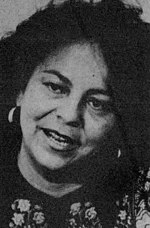LaDonna Harris
LaDonna Vita Tabbytite Harris (born February 15, 1931) is a Comanche Native American social activist and politician from Oklahoma.
She was raised traditionally by her maternal grandparents in a self-governing Indigenous community on a farm near the small town of Walters, Oklahoma.
[3] President Lyndon B. Johnson recognized Ms. Harris's accomplishments and her impact on Native Americans, and appointed her to the National Council on Indian Opportunity (NICO).
[1] With the support of President Johnson, Harris created the first Native American-education course, titled "Indian 101", to be required completion by all members of Congress.
She was recognized by Vice President Al Gore in 1994 as a leader in the area of telecommunications in his remarks at the White House Tribal Summit.
[2] She was an original member of Global Tomorrow Coalition, the U.S. Representative to the OAS Inter-American Indigenous Institute, and the United Nations Educational, Scientific and Cultural Organization (UNESCO).
[9] In the 1960s, Harris lived in Washington, D.C., and was in constant social and political contact with the top echelons of the Democratic Party, including President Lyndon B. Johnson and the First Lady.
[10] With the end of her husband's Congressional career, LaDonna Harris moved away from mainstream politics within the Democratic Party.
[7][8] Currently, she serves on the boards of Advancement of Maori Opportunity, Institute for 21st Century Agoras, National Senior Citizens Law Center, and Think New Mexico.
A unique adoption ceremony took place on May 16, 2012, at Harris's home in Albuquerque, New Mexico, attended by the cultural advisor for The Lone Ranger and an official from the tribe.
He's a very thoughtful human being, and throughout his life and career, he has exhibited traits that are aligned with the values and worldview that Indigenous peoples share", Harris said.
